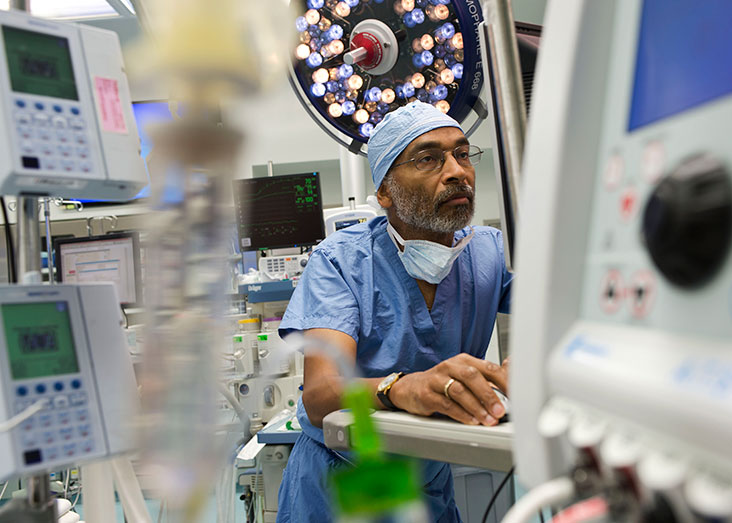Emery Brown ’74: Inside the mind

Physician-scientist is at the forefront of the intersection of neuroscience, medicine and patient care.
If you’ve ever received general anesthesia for a surgical procedure, you may have been told you were “going to sleep.” It’s a popular myth that Dr. Emery N. Brown ’74 is quick to dispel. “General anesthetics create a drug-induced, reversible coma — you’re unconscious, don’t feel pain, can’t move, and shouldn’t remember the procedure,” Brown says. “After the surgery, we reverse the coma.”
As a statistician and one of the world’s foremost physician-scientists in anesthesiology, Brown is renowned for his research on anesthesia and its effects on the brain. “There used to be all these theories about how anesthesia worked, but no one could really explain why someone became unconscious after receiving one of these drugs,” Brown says.
A practicing anesthesiologist at Massachusetts General Hospital (MGH), Brown determined that anesthesia creates brain oscillations, or waves. These waves impair the brain’s ability to communicate with the body, resulting in the unconsciousness we experience under general anesthesia. The responses of the brain circuits to anesthesia are affected by the type of drug used, as well as by a patient’s age, weight and health. “We can use these ideas to tailor anesthesia and cut down doses according to the patient type so there’s better control of the anesthesia and a faster wake-up,” Brown says.
Brown’s findings are also helping scientists and doctors to better understand consciousness, leading to new treatments for depression and pain management. His body of work has earned him numerous science prizes and the honor of being one of only 21 people — and the first African American — elected to all three branches of the National Academies of Sciences.
Despite earning top grades in science, Brown’s primary interest in high school was romance languages. At his mother’s suggestion, the Florida native attended Exeter’s summer program after his sophomore year of high school, then transferred to the Academy as an upper. Classes with French Instructor Aldo Baggia and Spanish Instructor Miguel Buisan further nurtured his lifelong love of languages. A trip to Barcelona during his senior year was revelatory. “It opened up the world to me,” Brown says. “Learning languages is a metaphor for learning about other cultures and other people.”
At Harvard, Brown became intrigued with statistics, earning a bachelor’s degree in applied mathematics, then a master’s degree and a doctorate in statistics along with his M.D. “Getting a Ph.D. in statistics along with my M.D. was very avant-garde at the time,” he says. “Statistics is about making inferences in uncertain circumstances. I knew that making inferences from data was going to be important scientifically.”
Brown completed an anesthesiology residency at MGH and broadened his focus to include neuroscience. At the time, in the 1990s, anesthesiology and neuroscience were very separate disciplines. “I realized that anesthesiologists used pharmacology to study anesthetic levels in the blood and lungs, but they weren’t thinking about their actions in the brain.”
Brown’s neuroscientific approach is opening up exciting possibilities. His team is studying the potential for Ritalin, a stimulant, to turn the brain on faster after surgery and reduce anesthetic side effects. Researchers are also investigating how ketamine, a general anesthetic, can be used at low doses to effectively treat severe depression. An intelligent anesthesia drug dosing system and site-specific medication may also be on the horizon.
Brown is a frequent lecturer (sometimes presenting in Spanish or French), professor of medical engineering and computational neuroscience at MIT, professor of anesthesia at Harvard Medical School and a practicing anesthesiologist. “Everything I’m doing is rewarding,” he says. “If I took away any aspect, I’d feel diminished.”
— Debbie Kane
Editor’s note: This article first appeared in the fall 2019 issue of The Exeter Bulletin.